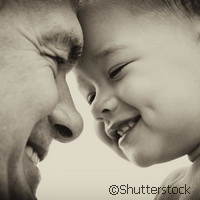European study reveals Septuagenarian grandfathers take a leading role
More than 5,500 grandparents aged between 60 and 85 have taken part in one of the largest observational studies in Europe, revealing that Europeans spend more time with their grandchildren, and that past 70 the grandfather takes a more prominent role. This is the conclusion of research, the Survey of Health, Ageing and Retirement in Europe (Share), which studied grandparents in 11 European countries - Austria, Belgium, Denmark, France, Germany, Greece, Italy, the Netherlands, Spain, Sweden and Switzerland. The study by Knud Knudsen, a professor of sociology at the University of Stavanger (UiS), Norway found that grandfathers appear to be more involved than before. Whilst grandmothers are more involved with their grandchildren when a couple is younger, this gender disparity gradually changes as the years progress. Professor Knudsen says, 'We're likely to see more grandparents spending time with their grandchildren. The basis for exercising this role can nevertheless differ between the genders. It's an advantage for both of them to have a life partner at their side. But grandfathers are more dependent on this than grandmothers when it comes to playing their grandparent role. This is because a grandfather who still has his wife finds it easier to share in the life of his grandchildren.' The study also revealed that new patterns are emerging, Professor Knudsen reports. 'Today's parents are occupied with work and career, and unlike earlier generations, when children came before education and job, modern parents are often older and in full-time work when they become responsible for offspring. Healthier and fitter grandparents who want to be with their grandchildren can be a big help to careerist parents in a hectic daily life.' With the change of modern parenting, there is also a changing role within the growing number of older people in Europe, which is why this year the European Union designated 2012 as the European Year for Active Ageing and Solidarity between Generations. As Europeans live longer and healthier lives, governments are looking for ways to involve older people more in society and to keep them active; these changes are expected to result in economic benefits for society as a whole, while at the same time promoting the physical, mental and social well-being of older members of society. Making this change in society is important as the European population is becoming progressively older - the latest figures show that there are slightly more than 87 million people aged 65 and over in the EU-27, some 17.4 % of the total population. This compares with data from 1985, when there were 59.3 million persons aged 65 and over in the countries making up today's EU-27 (12.8 % of the total population). Grandmothers have traditionally had greater and more varied contact with the rest of the family, with responsibility for maintaining relationships. Professor Knudsen observes, 'As a woman, mother and grandmother, norms for caring are clearer for her and she inspires the grandfather. A partner is accordingly important for contributing to the extended family, particularly for men as they get older. In line with other studies of gender and partnership, we see here that men in particular benefit from marriage.' What can also be seen from the study is that both social and demographic changes underlie the considerable involvement of grandparents with their grandchildren. As a result, three generations share more of their lives than ever before. What hasn't changed though is where marriage and partnerships are concerned. Men often marry women who are a few years younger than them, and women still live longer than men. This means that a man of 70 more often has a partner beside him than does a woman of the same age. So while grandmothers are usually alone, a grandfather is in a marriage. Having a younger and healthy partner seems to be crucial for a man's involvement with grandchildren. Professor Knudsen observes that some people may explain this study as a grandparent's desire to invest time with their grandchildren in order to be helped later. But, he adds, 'If they were correct, widowed grandmothers would be with the grandchildren most - and that's not the case.' It seems the sociological role theory appears to provide a better explanation. He continues, 'Grandfathers and grandmothers can have very different personal and social starting points. So although the latter spend more time with grandchildren than the former, the difference in participation shrinks steadily after 60. Past 70, the grandfather usually takes the lead.' Crucially, men generally manage relatively well as grandparents, for one important reason - they usually still have their partner at their side. But big differences nevertheless exist. Many grandparents have other priorities or live a long way from their grandchildren, which affects the time they spend together. The research concludes differences between the European countries in the study are small - which is significant in itself.For more information, please visit:The University of Stavanger, Norway:http://www.uis.no/research/article62676-51.htmlEurostat - Active ageing and solidarity between generations:http://epp.eurostat.ec.europa.eu/cache/ITY_OFFPUB/KS-EP-11-001/EN/KS-EP-11-001-EN.PDF
Countries
Norway



